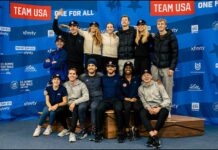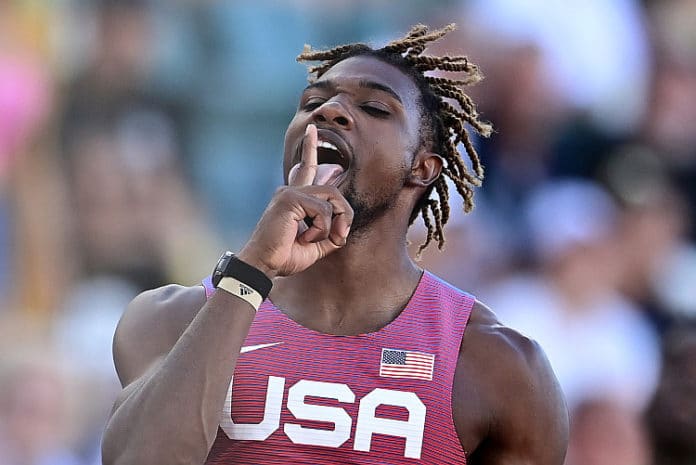★ The Sports Examiner: Surveying, monitoring and explaining the key competitive, economic and political forces shaping elite sport and the Olympic Movement. ★
★ To get The Sports Examiner by e-mail: sign up here! ★
≡ THE 5-RING CIRCUS ≡
1. World Champs road racing director says event “not financially viable”
2. Flash: LA28 Olympics will not solve L.A.’s homelessness problem
3. Putin suggests “major sporting events” for Shanghai Cooperation Org
4. Bach reiterates support for Milan Cortina ‘26, despite challenges
5. Paris 2024 starts ticket-sales program with registration in December
The race director for the six road events at the 2022 World Athletics Championships – marathons and walks – said the financial format for staging such events is not “viable” and requires “a huge amount of state funding.” At last week’s news conference closing the International Olympic Committee’s Coordination Commission meeting for the LA28 Games, a reporter asking how the Games would solve the local homelessness and cost-of-living crises got the truth: “If we just closed up shop and went away today, [these issues] will still exist and they will still exist in 2028. And no one should be confused about that.” Russian President Vladimir Putin suggested that the Eurasian countries in the Shanghai Cooperation Organisation should organize major sporting events, maybe as soon as 2024? IOC chief Thomas Bach said he has confidence in the under-pressure Milan Cortina 2026 organizers and agrees with waiting until after the Italian elections to name a new chief executive. And Paris 2024 announced how its initial ticket-sales process will work, starting with registration in December.
1.
World Champs road racing director says event
“not financially viable”
Eugene Marathon race director Ian Dobson served as the road races director for the 2022 World Athletics Championships in Eugene, and his eight-person team had quite an experience putting together two marathons, four walking events and a 1,200-person public 5k during 10 days last July.
A 2008 U.S. Olympian at 5,000 m, Dobson sat down for a fascinating interview with Keith Peters for the highly-respected Road Race Management site as the Worlds were coming to a close, with lots of details of the behind-the-scenes operations of the road program. But he closed with a warning:
“I think there’s a real tension between events like this and – I don’t know how to articulate the tension that’s in my head – but like, this type of [World] Championships event is not financially viable. It requires a huge amount of state public funding.
“Atlanta, I don’t know the half of it, but their hosting the [2020] Olympic [Marathon] Trials was wildly expensive. And until the federations and local governing bodies figure out how to do this in a financially responsible way, they’re just going to be better off going to places where suitable authoritarian governments can just make things happen that we can’t here.
“The level of frustration that World Athletics broadcast had with us, not being able to lay out 14 kilometers of dark fiber that – we’re talking about millions of dollars of infrastructure – that’s not even a possibility. I think in their minds, it was like, you should just do this, you should make this happen. And these are good people.
“The expectations are just not realistic in a financially responsible way. The funding for these events – I don’t know enough about it to have an educated perspective – but I do know that we did not, would not right now, try to bid for the Olympic Trials marathon. You’re just going to lose money. We’re just an LLC; we’re a business. Maybe that needs to go to a nonprofit, maybe that’s the model. Maybe it has to rely more on lobbying than organizing.
“It’s just discouraging to me to think that this may be the only time we do something like this here because USATF or World Athletics hijacks or holds hostage any of the revenue that comes in for it. Partnerships are a huge piece of that, but we could not do this again in the way that we did it. And to be clear, I would have done this for free. I learned so much. It was really hard, but I had a really good time.”
The Eugene Worlds received $40 million in government funding – $31 million from the state through various channels and $9 million in a U.S. government grant to promote tourism – about half of its overall budget. No financial results of the 2022 Worlds have been disclosed, but reports immediately after the event indicated it likely broke even.
As for the future, the word seems to have gotten out about the financial burdens, as no host for the 2024 Olympic Marathon Trials has been named yet by USA Track & Field.
2.
Flash: LA28 Olympics will not solve L.A.’s homelessness problem
The International Olympic Committee’s Coordination Commission meeting in Los Angeles last week made no headlines in the local press and demonstrated that interest is elsewhere with a hotly-contested mayoral election coming in November and contentious issues such as homelessness and the continuing drought roiling the community.
A National Public Radio reporter from local station KCRW asked how the 2028 Games were going to resolve the cost of living and homelessness issues. He got two very good answers, but no doubt not the ones he wanted:
● IOC member and Coordination Commission Chair Nicole Hoevertsz (ARU):
“We adapt to a city, we’re not expecting a city to completely adapt to us. And in this case, that city has its challenges, and that happens all over the world. And in the city of L.A., of course, you have specific challenges that we will have to deal with, but also the city has to deal with. We are preparing to do that.
“We don’t want to take over the city, we are incorporating ourselves in the city during those days.
“We’re not so naive to think the Games are going to be solving these issues, but they have to be addressed, that’s a fact.”
● LA28 organizing committee Chair Casey Wasserman, who has said he will think about running for California Governor after the Games are concluded, was even better:
“The challenges that we face with homelessness in the city are real, and if we sit around, hoping that the Olympics will do something to fix those, or is going to do something to make them worse in 2028, we failed this community. We, as leaders in this community, have a responsibility to deal with those problems today, because if the Olympics weren’t here in 2028, those problems exist today and they will continue to exist unless we deal with them.
“So, as a community, as a city, as people who should care about each other’s well-being, homelessness is an issue we need to deal with. It was neither created by, or is going to be solved by any event, and so we need to be focused, as community leaders, as citizens of the city, what we can do to really make a difference in the lives of those who are affected. …
“We are committed to making sure that our plan, our operations fit within the city, and benefit the city, and hopefully, it becomes a motivating factor for everyone, when the entire eyes of the world will be on the city, that we can show the world that we had challenges and we worked together to overcome them.
“If we just closed up shop and went away today, [homelessness and the cost of living] will still exist and they will still exist in 2028. And no one should be confused about that.”
The lack of interest in the 2028 Games among local media was reflected in the news conference receiving 19 lines of coverage in the Los Angeles Times’ “The Day in Sports” round-up section the day after and only a reference in a story in the 10-paper Southern California News Group conglomerate, which focused mostly on U.S. Olympic & Paralympic Committee Chair Susanne Lyons’ comment that the IOC was beginning to think about re-admitting Russian athletes.
3.
Putin suggests “major sporting events” for
Shanghai Cooperation Org
The Russian sports ministry has said that the country has no plans to create an “alternative” to the Olympic Games, but the concept has not gone away.
Russia revived the national Spartakiad concept in 2022, with a plan to hold the event every four years, and in early September, Sports Minister Oleg Matytsin told the Eastern Economic Forum:
“We keep extending invitations to come here and hold negotiations with our colleagues from BRICS and the [Shanghai Cooperation Organisation] with the aim of hosting tournaments and bilateral meetings. … Our President’s stance is that we are a self-sufficient sports power boasting tremendous resources.”
Last week, Russian President Vladimir Putin expanded the idea, telling the SCO Summit in Samarkind (UZB):
“It seems that there are good opportunities to intensify sports cooperation with the prospect of holding major sporting events under the auspices of the SCO. To do this, we could think about creating an association of sports organizations under our association.”
The idea was seconded by Belarus President Alexander Lukashenko, an observer at the SCO:
“We suggest the possibility of holding a complex of sporting competitions within the framework of the SCO: summer events in 2024, winter in 2026.”
On Tuesday, Russia’s Irina Viner, head of the Council for Physical Culture and Sports of the Russian-Chinese Committee for Friendship, Peace and Development spoke even more plainly:
“We are ready to negotiate with China to hold various events, from joint training camps to competitions. As our leaders Xi Jinping and Vladimir Putin said, now we must create a multi-sports organization independent of the IOC.”
The SCO, founded in 2001, includes China, Russia, four other former Soviet Republics, India, Iran and Pakistan, with Afghanistan, Belarus and Mongolia as observers and another nine countries – including NATO member Turkey – as “dialogue partners.” Its primary focus has been on security matters, but cultural, economic and now sports issues have come up.
Observed: The comments underscore the belief in Russia and Belarus that the sporting sanctions against it related to the invasion of Ukraine are going to go on for a long time to come, despite chatter to the contrary. There’s an eerie echo, almost a matter/anti-matter universe quality to Putin and Viner’s comments vis-a-vis those of U.S. television visionary Ted Turner in 1985, who created the Goodwill Games – first held in Moscow in 1986 and ending in 2001 – to try and bring east and west together. Now, Putin’s SCO comments signal a desire tear international sport apart.
4.
Bach reiterates support for Milan Cortina ‘26, despite challenges
“As always before Olympic Games, there are challenges – in particular light of this new emerging world order and the financial and economic crisis.
“But we have overcome some challenges in the last couple of years. So I’m not too worried because we know about the enthusiasm, efficiency and the dedication of our Italian friends.”
That’s IOC President Thomas Bach (GER), during last week’s visit to Italy, where he met with Prime Minister Mario Draghi, with national elections coming up quickly on the 25th that will form a new government.
Given the financial difficulties of the Milan Cortina 2026 organizing committee, which has required governmental financial support, there is little doubt that a new chief executive will be named to replace Vincenzo Novari. But not until after the elections, a point which Bach agreed with:
“The new chief executive must and should have the support of the new government. It would not be desirable to appoint him now, before the national elections.”
Bach also reiterated his view on the expensive-to-renovate bobsled, luge and skeleton run in Cortina, used for the 1956 Winter Games, budgeted at €80 million:
“[T]his would be a touristic and sport project which would go ahead anyway and regardless of the Olympic Winter Games.”
The IOC tried to get the Milan Cortina bid committee to change this site, but local authorities are determined to have it as a centerpiece of a larger recreational renovation program in the Cortina area.
SportBusiness reported good news for the 2026 organizers with the Italian office of TOP sponsor Deloitte agreeing to be the third domestic sponsor, providing management support for the event.
5.
Paris 2024 starts ticket-sales program with registration in December
Tickets for the Paris 2024 Games will go on sale in early 2023, with the sign-up process to start in December. The procedure was announced on Tuesday:
● Registration on the Paris 2024 ticketing site from 1 December 2022 to 31 January 2023.
● Beginning 15 February 2023, registrants selected at random will receive an email allowing purchase of “ticket packs” – tickets to three sessions – according to availability, for 48 hours.
● The first four days of the ticket-sales period – 15-18 February – will be reserved for members of the Paris 2024 Club, which can be registered for on the Paris 2024 site.
The announcement further noted that “Paris 2024 will open the sales phase for single tickets for the Olympic Games in May 2023 and for the Paralympic Games in autumn 2023.”
The Paris organizers are offering tickets beginning as low as €24 each, with one million tickets at that price and “Almost half of all Olympic tickets for the general public at €50 or less.”
≡ PANORAMA ≡
● Olympic Games 2036 ● Egypt wants to host the 2036 Olympic Games and will discuss the concept with IOC President Bach when he visits on the 24 September.
Bach will visit Cairo and tour the sports facilities in the country’s $45 billion New Administrative Capital, begun in 2015. The program includes a 93,400-seat stadium, two arenas, a velodrome, and other sports facilities. Egypt is one of many countries talking about 2036, but the IOC has shown great interest in trying to place a Games in Africa as soon as is practical.
● Archery ● Greg Easton, son of former World Archery President Jim Easton, resigned from the World Archery Executive Board as of last Friday (16th), citing “personal and professional reasons.” He added:
“My ongoing work with the Easton companies, the Easton Foundations and other ventures will continue my lifelong involvement in archery, and I look forward to continuing to support worldwide archery.”
Jim Easton, now 87, built his father’s arrow-manufacturing business into a sporting goods powerhouse, with market-leading equipment in baseball, softball and hockey as well as archery. He served as the Commissioner of Archery for the 1984 Olympic Games in Los Angeles, and was so widely respected that he also assisted the organizing committee as a Vice President of Technology and the Mayor of the UCLA Olympic Village!
During his 1989-2005 term as the President of FITA (as World Archery was then known), he led the changeover to elimination matches that helped popularize the sport on Olympic television and ensured its continued place in the Games. He served as an IOC member from 1994 to 2015, received the Olympic Order in 2015 and is an Honorary Member today.
● Athletics ● It’s not an Olympic event, but worth noting that Lithuanian ultra-distance runner Aleksandr Sorokin, 41, broke his own world mark for the 24-hour run last Saturday (17th).
He covered 319.614 km (198.599 miles or ~7:15 per mile!) at International Association of Ultrarunners European Championships in Verona, Italy, smashing his 2001 mark of 309.4 km (192.252 miles). Wow!
¶
The promised audit of the All-Russian Athletics Federation by World Athletics is now scheduled for the latter half of October. World Athletics has had the RusAF on suspension since the state-sponsored doping scheme exploded in 2015, but has been continuously reviewing the situation to determine whether the suspension can be modified or lifted.
Former sprint star Irina Privalova, now the interim head of RusAF, told the TASS news agency that the steps required of it are being taken and that a reinstatement of the federation could occur by the end of the year.
● Fencing ● Amid last week’s confusion about the beginnings of a discussion about Russian reinstatement, the Ukrainian Sports Minister, Vadym Guttsait – also the head of the Ukrainian Fencing Federation – wrote to the Federation Internationale de Escrime (FIE), asking for the continued ban on Russian and Belarusian athletes:
“The ban on the participation of all Russian and Belarusian athletes in international competitions will have an impact on Russian and Belarusian society.
“The Ukrainian Fencing Federation urges you to prevent the return of Russian and Belarusian athletes to international sports competitions, even under the neutral flag. Representatives of aggressor countries cannot be part of fair and honest Olympic sports while Russia continues this bloody war.”
¶
“[W]e’re pleased to introduce the USA Fencing Member Wellness Program – a new initiative that offers free, confidential counseling services to members who need mental health support.”
USA Fencing has had athlete issues and team dissension over questions of abuse, so this new program is quite timely. Open to athletes, coaches, officials or other USA Fencing members who need mental health support, a contact is made with the USA Fencing office, who will “connect that member with a licensed clinical social worker, a licensed professional counselor or a licensed professional with a doctor of psychology degree.”
The announcement also mentioned USA Cycling, USA Weightlifting and the U.S. Olympic & Paralympic Committee as providing similar services.
● Football ● Ecuador’s place in the 2022 FIFA World Cup was confirmed by the FIFA Appeal Committee on Friday, which turned down a request from Chile to invalidate Ecuador’s results due to the use of a Colombian player.
Byron Castillo, who was born in Colombia, played eight games for Ecuador during the qualifying phase. The Appeal Committee “deemed that on the basis of the documents presented, the player was to be considered as holding permanent Ecuadorian nationality” and was eligible.
Chile, which would advance to the World Cup if Ecuador were to have its results nullified, plans to appeal to the Court of Arbitration for Sport. The tournament begins on 20 November.
¶
“All Russian teams are currently suspended following the decision of the UEFA Executive Committee of 28 February 2022, which was further confirmed by the Court of Arbitration for Sport on 15 July 2022. Russia is therefore not included in the UEFA European Football Championship 2022-24 qualifying draw.”
UEFA’s Tuesday announcement confirmed Russia’s non-participation in the Euro 2024 qualifying program, but Belarus is included in the teams to be drawn into qualifying pools on 9 October in Frankfurt (GER).
● Modern Pentathlon ● The PentUnited athletes group was at it again over the weekend, needling the Union Internationale de Pentathlon Moderne (UIPM) and its insistence that the IOC has required the federation to remove riding from the sport. Noting the attendance of IOC chief Bach at the FEI World Eventing Championships in Italy:
“Seems IOC President Thomas Bach doesn’t have a problem with horse sport #savepentathlon #keepridingandchangetherules”
and
“‘I’m very impressed by the many measures the FEI has taken to safeguard the well-being and the health of the horses, and I am pleased with everything the International Federation is doing to ensure the future of the sport.’ Bach”
The athletes group has continually asked for documentation of the UIPM’s view that the IOC instructed the federation to replace riding with a new discipline in the aftermath of the horse-punching incident at Tokyo 2020 involving the coach of German pentathlete Annika Schleu, whose horse – Saint Boy – refused to jump, eliminating Schleu from medal contention.
¶
You can receive our exclusive TSX Report by e-mail by clicking here. You can also refer a friend by clicking here, and can donate here to keep this site going.
For our updated, 620-event International Sports Calendar for 2022 and beyond, by date and by sport, click here!






















